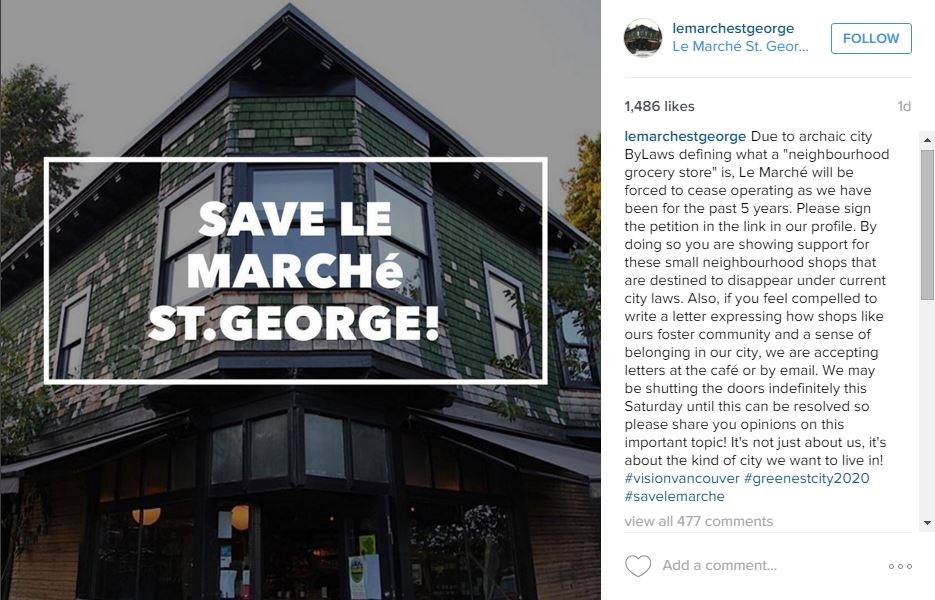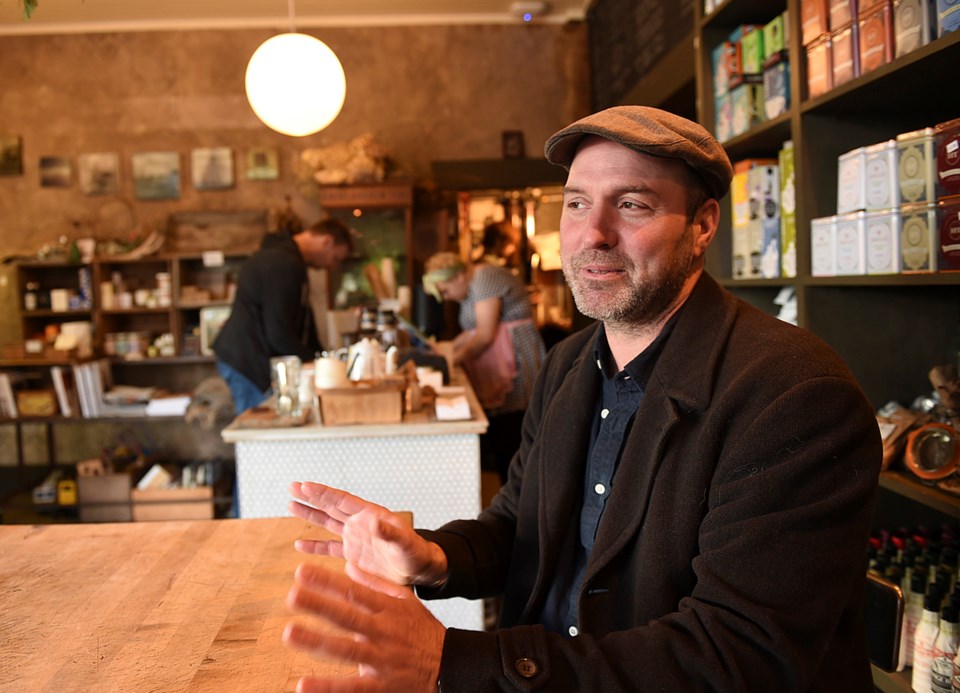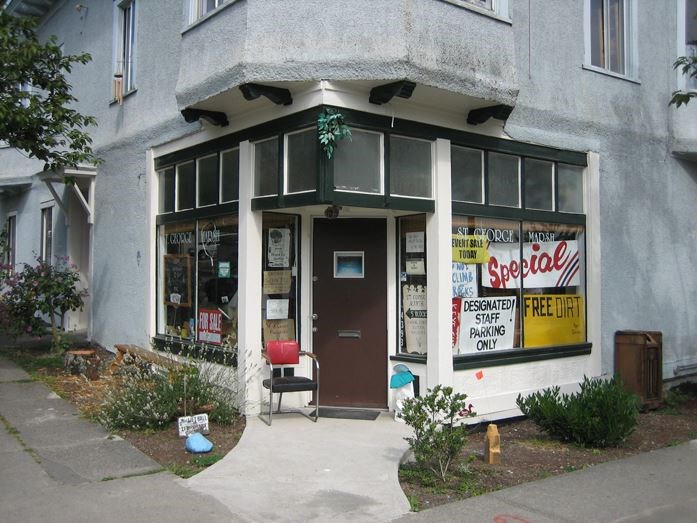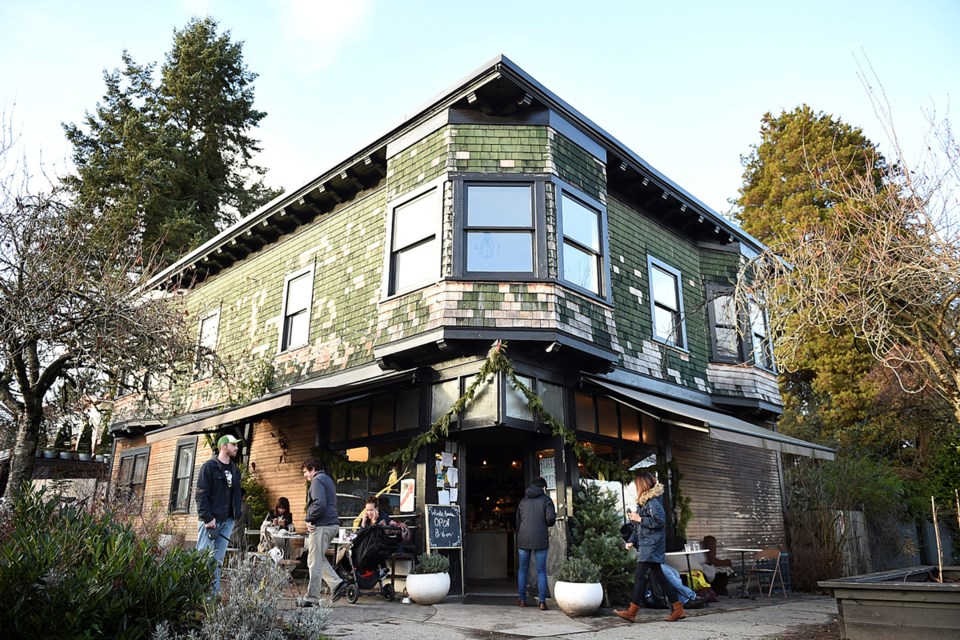A well-trafficked market in Mount Pleasant that promotes itself as a quaint ma-n-pa grocer, a place to drink beer with Santa and mingle with “famous people who sometimes drop by,” and a household with “three chickens, two cats, and two bee hives,” is now also the place that really did “get caught doing renovations without permits.” More or less, and much more.
All this quaintness is promoted from the website of Le Marché St. George, which last week had its knuckles rapped because the owners were caught without the full slate of city permits to, among other things, run a seasonal retail store in a residential rental suite as well as run a café. Although it had a health permit to reheat and serve food, the Marché did not have a business licence to operate a café in what was essentially a grandfathered commercial space within a single-family residence. Its permit for outdoor seating was a bureaucratic mistake.
The owners, also partners and parents, Pascal Roy and Jakani Larsen, launched a petition over their concerns the City of Vancouver would shutter the popular destination within days. The news broke quickly, followed by a spate of corrections, an unusual public clarification from the city, and even a Facebook post from the mayor — all as social media, determined advocates, a blind artist and neighbour, opinionated blogs, inaccurate reporting and a 24-hour news cycle accelerated the frenzy. All over the question of what Vancouver wants for its neighbourhoods.
Today, Le Marché St. George is operating as it always did. In January, the work begins to pair the market with the permits it needs to continue operating as it has for five years. After that, a resolution could mean similar markets open on a corner near you.
The beginning: A petition for help
The first tweet from Le Marché on Nov. 30 didn’t draw a lot of attention.

But the campaign grew traction the next week, notably after a Dec. 7 Instagram photo and Facebook post issued pleas to “save” the market.

That same day, the owners created a petition and blamed “archaic city bylaws” that limited the function of neighbourhood grocers, a residential-meets-commercial designation that stopped in 1980. Because of these onerous and vague restrictions, their argument went, “Marché will be forced to cease operating as we have been for the past 5 years.” Their city-assigned property use inspector recommended they ask other neighbours to speak out on their behalf. It's oft-repeated advice, but not often do thousands speak up.
The plea inched closer to an ultimatum: “We may be shutting the doors indefinitely this Saturday until this can be resolved…”
In 48 hours, more than 16,000 people defended the store many of them had patroned for half a decade. “By doing so you are showing support for these small neighbourhood shops that are destined to disappear under current city laws,” the petition stated.
Thousands of fans feared the café was being forced to close. It wasn’t. Not quite.
Janaki Larsen, who prepared to open Le Marché six years ago while she was pregnant with her daughter, said in an interview they did not intend to misrepresent the situation that the city was closing the store. But as far as they were concerned, by specifically revoking their small patio licence for outdoor seating, the city would have prevented them from turning a profit and, “in essence, remove 75 per cent of our business and close us down.”
The city made a mistake in giving Le Marché its outdoor patio licence. It was revoked despite an initial promise the city would allow the market to operate as before. “They confirmed that had to go, that they issued it to us in error,” said Larsen on Dec. 10. But a week later, that decision was again overturned and on Dec. 18, Larsen said the outdoor seating could remain.
Piling on the confusion last week was the speed at which their plight reached neighbours and a broader audience. “It happened so fast,” said Larsen. “Monday night [Dec. 7] we put up a petition and by the next day it was 6,000 signatures. There were reporters. CBC made it sound like our patio was on the sidewalk, so people were calling me, asking, ‘Why do you think you can have your chairs on the sidewalks?’
“If we had to take all our seating away and take our pastries away and suddenly start selling muffins in a plastic bag, we can’t survive doing that and I don’t want to survive doing that,” she said. “That became the issue — we’ve been running for five years this way with really not a lot of problems except for one person.”
The backstory: a neighbour complains
Le Marché has a neighbour problem. And a neighbour has a problem with Le Marché.
In an interview with Courier columnist Jessica Barrett, the neighbour, a legally blind woman, said, “It’s like people don’t recognize what a white cane means anymore.” She said the sidewalks outside Le Marché were a crowded landscape of changing obstacles, some of them the living forms of infants and dogs. She repeatedly asked the owners to accommodate her and she filed complaints to the city. She asked to remain anonymous despite her name having been published elsewhere.
The woman is a graphic designer who was part of the Main Street avant-garde arts establishment in the 1970s, ’80s and ’90s. “Going blind cannot be easy,” said Larsen, who also describes herself as an artist and works as a potter.
Over the past five years, good will slowly dried up between these two residents. A reputation about the blind neighbour grew among market patrons, some who rolled their eyes at her mention. Tolerance eventually dwindled though it didn’t start out this way, said Larsen.
“I used to be very diligent about it. If we were doing things, I would email her and say, ‘This is what we’re doing on these dates.’ That would result in a visit from the city, saying, ‘I heard you were going to do this and I heard you were going to do that. You can’t do this and you can’t do that.’ So, I kind of stopped emailing her about those things.”
Larsen said they put up a sign to keep patrons from sitting on the neighbour’s front boulevard and also planted a garden to enforce the message. Then they got a permit from the city to allow outdoor seating, which gave people a designated place to sit.
“I didn’t give her name to the media and I don’t know how they found out. I asked the inspector if it’s more than one person [complaining] because if it’s more than one person, it’s an issue that needs to be addressed on a broader scale,” said Larsen.
The owners have since heard from other neighbours who said parking space can be limited because of traffic to Le Marché. Larsen said they are seeking residential-only parking restrictions on several streets around the market.
“I don’t feel we are people who are disrespectful, but she made it to a point where I didn’t really want to help her out that much anymore because it felt like we were being constantly harassed,” said Larsen, who added that the neighbour took photos of patrons and their children on the sidewalk outside Le Marché. “Everything from the gardens being too wild and […] they’ve taken photos of us having dinner in our backyard, which has nothing to do with the sidewalks. I’ve been told by her before, ‘I just don’t want to see anyone around.’”
City communications staff would not answer questions about the number of complaints received about Le Marché. The city would not say if those complaints came from one or multiple residents or addresses or how many were anonymous. The city would not answer questions about the nature of those complaints. City staff did not reply to follow-up questions from this reporter other than to link to a public press release.
In a phone interview last week, Andreea Toma, the city’s chief licence inspector, said the most recent complaint was left anonymously by voice message. The city protects the names of complainants.
The complication: a few missed facts
Within the same hour on Dec. 8, the petition and its campaign was supported by websites Vancouver Is Awesome and Vancity Buzz, both publishing unabashed defences of the market as a cherished community space that needed and deserved all our protection. No information was reported on permit requirements nor was there comment from city staff or citation from civic documents, but in the VIA story titled “Let’s Save Le Marché St George,” the author refers to the complaint from “one neighbour of theirs who is threatening their business.”
(The author of that story, Bob Kronbauer, said he was not contacted by the Marché owners to cover their story and said a friend sent him one of their Instagram posts. Larsen said she was not contacted by VIA or Vancity Buzz to pay for editorial coverage. Both websites sell packages designed to make advertising look like news or human interest features.)
The neighbour was branded in Scout Magazine as an “asshole” and “the only person who serves to benefit from the enforcement” of these permits. The same article, by Scout publisher Andrew Morrison who promoted Le Marché in 2011 for a UK-based magazine article, also cuts through the rhetoric to point out the market was “not in danger of closing. It’s not being forced to do anything except abide by the rules.”
Adding to the confusion, credible news sources also misreported the story albeit without preaching on the market’s behalf. Talk radio station CKNW ran a correction Dec. 9 after an online story claimed the city was forcing the market to close, “as has been widely reported,” according to unattributed staff.
The correction read, “In an earlier report, we wrote that the city had taken away the store’s license to serve food. The city has clarified that they have not taken away their license.” In fact, the store never had a City of Vancouver business licence to prepare food. It could warm up pre-made food, such as croissants, and was allowed three seats. To complicate things further, Le Marché did have a Vancouver Coastal Health permit to serve food.
“Usually we work in conjunction,” Toma said about the City and VCH.
“The community loves it [Le Marché], but to change bylaws and regulations without really understanding the implications, you don’t want to have a knee-jerk reaction. This is why we take our time, we work with the business to fully understand their options and their goals,” she said.

“The owner himself said, ‘We have shut him down.’ It’s not our practice to come down with a hammer and shut businesses down. We have a process, we don’t have the authority to show up and just shut them down.”
The source of some misinformation reported by CKNW and elsewhere appeared to be one of the market’s owners and Larsen’s partner, Pascal Roy. The petition and social media campaign generated fear about an imminent closure and drummed up a groundswell of attention over the worst-possible outcome for a small and cherished business. The media tried to sort it out. Roy said in a radio interview the city had not been in touch with him or Larsen after the initial inspection earlier in the month. Toma said reaching the city is as easy as dialling 3-1-1 and also said the phone number on Le Marché’s business licence was out of service. Furthermore, the phone number on the website for Le Marché does not have an answering machine and the business was receiving hundreds of emails and social media messages at the time.
Again, from the radio station’s corrected story: “In an interview with CKNW yesterday, co-owner Pascal Roy said an inspector had spoken with them and said the eatery’s licence to serve food and have outside seating would be pulled on Friday.” Such statements, the station clarified, “are not completely accurate.”
The other complication: conflicting permits
In their first issued statement on this story on the morning of Dec. 8 while still less than 4,000 people had signed the petition, the city emailed reporters a canned comment (a common practice) from the chief licence inspector. The emailed statement cited a neighbour’s complaint that “the business was promoting seasonal sales using residential designated space.”
It was a pop-up shop, called the Winter Market. There was no mention of a grocery store operating as a café or offering patio seating. No concerns about croissants or sidewalks, strollers or crepes.
The statement said a property-use inspector visited Le Marché Dec. 3, five days before the petition went online. The statement continued, “The City is committed to ensuring housing stock is available for residential use and has required the business to fall into compliance. The property-use inspector informed the owners of Le Marché St. George that they cannot use the residential space as retail without proper approvals in place which may require a rezoning application if so desired.”
And there was this attempt at clarification: “The City will continue to monitor this address to ensure compliance; but to be clear, the market can continue to operate as currently approved under city regulations.”
But what was that, exactly? What is a neighbourhood grocer? It’s a good question, and one the owners of Le Marché had asked, too. "Depending on the day, you'd get different information from different people at City Hall," said Larsen.
And a note about the rental: Larsen said the suite was rented and lived in by a family friend. The secondary apartment was and remains housing, she said. “No one was ever evicted and no one’s living space was taken away,” she said, adding that they paid the rent while the friend stayed put simultaneously as the retail store opened during the holidays.
After their petition implied the market was closing and once media picked up on the panic, the city took the unusual route to issue a press release on Dec. 9. It read, “Reports about an imminent closure as early as this weekend are completely false. As stated yesterday, City staff will work with the owners to better understand business practices and look at options to enable the activities at Le Marché St George to continue.”
The initial complaint was about a rental suite. City inspectors arrived and saw the patio seating. The owners’ pleas and petition were about serving crepes and coffee to neighbours and their children they’d seen grow up. The pop-up shop, the reason for the initial complaint and subsequent inspection, had already been relocated some 22 blocks north near Ontario Street.
The permit: a grocery store
The owners were licensed to operate a grocery store in a residential area (that’s known an RS-1 District) and sell packaged foods, cigarettes and magazines. When they brought their initial designs to city hall for approval, Larsen said an inspector asked where the chip rack was located.
“There was no real written-down definition of what it could be,” she said, “and [city staff] said, think of a 7/11, that’s what these places are for. […] She said it’s like a 7/11 or a gas station corner store. Those are very different things from what we’ve been doing. We knew when we bought the place we didn’t want to do anything like that. That is not what was interesting to us.”
Larsen always intended to serve food at Le Marché and was told they could reheat but not prepare food. “We can’t cook anything there, so we tried to find the best croissant in town we could, and for the first year, we went to pick them up every day and bring them in.”
Eventually, they got a food establishment permit from Vancouver Coastal Health. It allowed them 21 or fewer seats and came with a health inspection every six months, she said. “People make it sound like we’re running some lawless renegade restaurant, but we’ve had a permit.”
The owners took creative licence with their 320-square-foot grocer, admittedly. But also felt they had covered their bases on important matters, like health inspections and patio licences. When the pop-up shop was prohibited, they closed it and adapted. They also cancelled a fundraiser for Syrian refugees.
“When you’re doing weird unconventional things, you try to fit it in,” said Larsen. “The problem with us is that we are always running in this grey zone. We are not black and white kind of people. There are all these things in between with the building. I feel since we own the building, we should be able to do some certain things with it and we’ve told neighbours and I’ve told the city we won’t do pop-ups there anymore. If it’s an issue then that is the end of that. I’m find with that.”
These contradictions added to the grey: One licence for three seats and another for 21; a permit to serve food but no business licence to do so.
The city and its staff dealt with Le Marché in good faith, said Larsen. “I absolutely do [feel that way]. And I feel, like, for a long time, they didn’t want to make a big deal out of anything and, to be honest, I feel like they knew. How could they not know what we were doing? Common sense would lead you to believe this is not a detriment to the neighbourhood. We are not causing bodily harm, we are not open late.
“You ask anyone else who owns these little corner stores and it is not a big money-making scheme. And then to take away the thing that actually does make some part of the money, it is just not viable.”
Unlike convenience stores such as 7/11 or Mac's, Le Marché is zoned to operate in a single-family dwelling residential area known as an RS-1 District, which also applies to lane-way houses and can encompass such diverse buildings and institutions like ambulance stations and hospitals, neighbourhood houses, churches, golf courses, sports arenas, marinas and zoos. Yes, if a zoo were to nestle among Vancouver Specials. The city’s RS-1 document is 10 pages long. An additional document with 14 of pages includes “additional regulations.” If you can spare the brain cells, these regulations include provisions like this:
5.2 The Director of Planning may relax the height and yard provisions of sections 4.3, 4.4, 4.5, 4.6 and 4.16, and the floor space ratio exclusions for parking in accessory buildings of section 4.7.3(c)(i) of this Schedule where, due to conditions peculiar either to the site or to the proposed development, literal enforcement would result in unnecessary hardship, provided that: (a) he first considers the submission of any advisory group, property owner or tenant; and (b) in no case shall the height be increased to more than 10.7 m or the yard requirements be reduced to less than 60 percent of the amount specified in this Schedule.

It’s possible that the fallout from the past two weeks could lead to an update on a neighbourhood grocer, a contemporary community-oriented policy that doesn’t limit grocers in buildings purpose-built before 1980. “There is potential for them [the city] to come out looking really good. And we get to keep making crepes,” said Larsen.
Before Larsen and Roy opened Le Marché in 2010, the corner store operated for a decade as the St. George Marsh, an art space “intermingling museological oddities with ingestible goods and art,” named for the wetlands that once dominated this north-facing slope of Mount Pleasant. It sold items from books to piggy banks and, experimental as it was, it fit within bureaucratic bounds of a neighbourhood grocer.
Before that, the building was owned by a Japanese family who ran a store and sold classic convenience store fare like magazines, candy and packaged and tinned food. You could also buy single cigarettes out of a back closet.
Larsen asked with a laugh, “Where’s the permit for doing that?”
This story was corrected Dec. 21 to change Max to Mac's convenience store.



